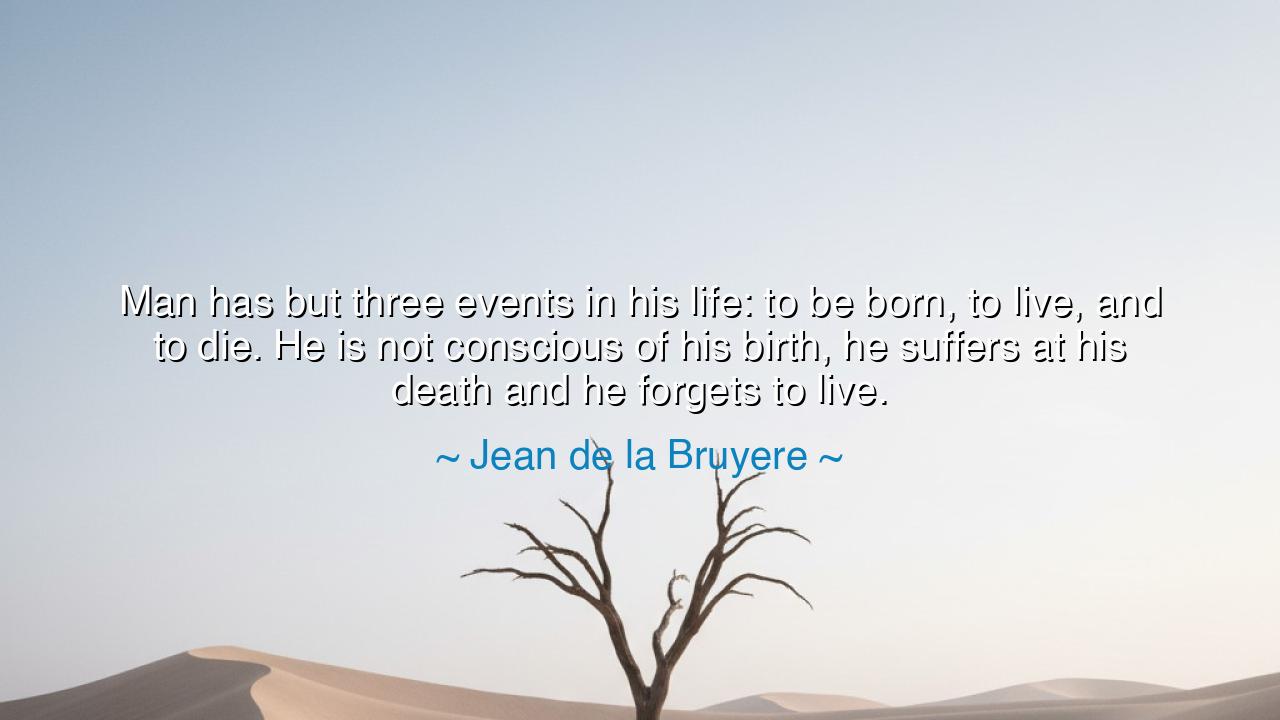
Man has but three events in his life: to be born, to live, and to
Man has but three events in his life: to be born, to live, and to die. He is not conscious of his birth, he suffers at his death and he forgets to live.






Jean de La Bruyère once wrote: “Man has but three events in his life: to be born, to live, and to die. He is not conscious of his birth, he suffers at his death, and he forgets to live.” These words, drawn from the heart of seventeenth-century France, cut through time like a blade of quiet truth. La Bruyère, a philosopher and moralist of the Classical Age, looked upon the world and saw a people obsessed with beginnings and endings, yet blind to the sacred middle — life itself. His lament was not of cynicism, but of sorrow and wisdom: that men chase the horizon of existence, yet fail to feel the ground beneath their feet.
To be born is an act of mystery. It is the first cry, the first light, the first touch of air upon the skin — and yet, we do not remember it. We enter this world like travelers waking from a deep sleep, unaware of the journey that carried us here. Birth is the work of others — of parents, of nature, of divine will. In it, man is innocent and helpless. He is a vessel into which life is poured, a spark thrown into the vast night of possibility. There is no merit, no choice, only arrival. Thus, La Bruyère reminds us: we cannot claim our beginning; it is a gift bestowed, not a conquest earned.
To die is the mirror of that first mystery. Unlike birth, we are conscious of our dying. The body weakens, the breath shortens, the light dims, and the soul trembles between two worlds. There is pain, not merely of the flesh, but of regret — regret for the words unsaid, the loves unexpressed, the joys postponed. La Bruyère tells us that man suffers at his death because he has lived half-asleep. When the end draws near, he grasps too late at the fleeting beauty of life, like a man clutching at smoke. Death is the teacher none can refuse, yet most hear too late.
Between these two mysteries lies the forgotten realm — to live. It is strange, says La Bruyère, that the one event within our power, the one where we can act, choose, love, and create, is the very one we neglect. Man busies himself with wealth, ambition, and the pursuit of security, as though life were a burden to be managed rather than a song to be sung. He dreams of tomorrow, fears yesterday, and forgets that only today belongs to him. Thus, life slips through his fingers, not because it is short, but because he fails to hold it with presence and gratitude.
Consider the story of Marcus Aurelius, the philosopher-emperor of Rome. Surrounded by war, politics, and the weight of empire, he still found time each dawn to write in his journal: “When you arise in the morning, think of what a precious privilege it is to be alive.” Though emperor of the known world, he knew his greatest kingdom was within — the quiet mastery of his own heart and mind. He understood what La Bruyère meant: to live consciously, not as a spectator of time, but as its companion. His wisdom echoes through centuries, a reminder that true living is not measured in years, but in awareness.
How many souls, even now, walk the earth as if under enchantment — breathing, but not awake? They wait for happiness to arrive, as though it were a guest delayed at some eternal feast. They postpone joy until the perfect moment, which never comes. They forget that to live is not to possess things or to escape pain, but to feel deeply — to embrace both the sorrow and the splendor that make existence whole. To live is to weep, to wonder, to hope, to fall, to rise again. It is the courage to be present in every heartbeat.
Let this be the lesson that endures: remember to live. Do not let the noise of the world drown out the quiet song of your own being. Speak the words of love while the ear can still hear them. Look upon the sky with gratitude before night falls. Forgive, create, and marvel. Each day is a birth renewed, and each night a gentle rehearsal for death — but between them lies the sacred task of living well. Do not forget it, for that forgetfulness is the true tragedy of man.
So when you awaken tomorrow, do not rush to your duties as if life were a debt to be repaid. Pause. Breathe. Feel the pulse within your chest, and whisper to yourself the ancient truth: “I am alive — this is my hour to live.” For though birth and death may be beyond your grasp, the art of living belongs entirely to you. And in mastering it, you fulfill the deepest wisdom of La Bruyère — that man, who forgets to live, can yet be reborn each morning in the miracle of awareness.






AAdministratorAdministrator
Welcome, honored guests. Please leave a comment, we will respond soon